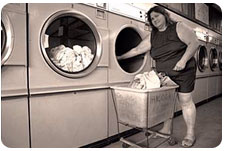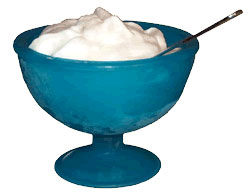|
It wasn’t all romance. There was a domestic side to our lives, too. Though we were both sloppy and tended to drop our clothes all around the room, we shared the cooking and washing.
One day I brought a load of clothes to the neighborhood laundromat. I tenderly tugged at the inside-out sleeves of  Armand’s slightly sour-smelling shirts, and bundled them with ranker-smelling panties, shorts, and tee-shirts into one of the empty washing machines. Cheerfully inhaling the smell of detergent and bleach, I reflected on how our raging hormones affected our body odor. Armand’s slightly sour-smelling shirts, and bundled them with ranker-smelling panties, shorts, and tee-shirts into one of the empty washing machines. Cheerfully inhaling the smell of detergent and bleach, I reflected on how our raging hormones affected our body odor.
I felt eyes on me and turned to see a young brunette woman in hip-hugger jeans and a denim jacket at the next machine covertly observing my laundering technique. I caught a familiar smug look in those eyes that were now staring at me through her granny glasses.
“Millie?”
“Yes?”
“It’s me! Andrea from Brooklyn College!”
Five years ago, she’d been one of the most popular girls at school. She didn’t even talk to me. Why was she talking to me now?
“Andrea! How are you?”
“Great! I got married four years ago.” She flashed one of her manicured hands, so I could see her small but bona fide, if four-year-old, diamond ring.
“Congratulations,” I murmured, wishing I had gone to a different laundromat.
“I never saw you here before,” she said, as if reading my mind. “Do you usually go somewhere else to do your laundry?”
“My boyfriend and I just moved into the neighborhood,” I said.
Touché! It put me on almost equal footing.
She smiled warmly.
“Benji and I live around the corner.” Without missing a beat of feminine grace, she jerked her teased head of hair toward her quadruple wash load. “We have two toddlers. Benji’s with them now, so I can take care of this.”
She moved her face closer to mine and emphatically mouthed her words.
“At first, we were nervous about--you know--an apartment around here. But we think the neighborhood is getting gentrified.”
I’d never heard the word before, but I could guess what she meant. More middle-class white people were moving in.
We settled into a couple of minimalist white plastic chairs with indentations for our behinds--Andrea’s, I noticed, though no bigger than mine, was more shapely-- and left our pocketbooks and boxes of detergent on the unpainted wood floor.
I saw a stick of gum pointing at my face.
“Juicy Fruit?” Andrea inquired.
“No thanks.”
She stuck a piece in her own mouth, and went on to talk about the best places to shop in the neighborhood. I dimly realized that she accepted me--at least as someone to gossip with. While I half-listened to her talk, I reflected on what a nice feeling it had given me to say “my boyfriend.” It almost didn’t matter who my boyfriend was, as long as I had one. I was intoxicated with the idea. It was like a long-awaited dream come true--my password to the world of normality.
Suddenly, my ears took in what Andrea was saying.
“Did you hear about Professor Lester?” she asked.
“From Brooklyn College?”
“Yes.”
He’d been my favorite English teacher--one of the few adults who understood me when I was eighteen years old. He once gave me a ride home from class in his convertible. Discussing my paper had just been an excuse for a detour on the Belt Parkway, so we could drive along the New York Bay and feel the wind in our hair.
“What about him?”
“He died.”
“Oh, no!”
I felt as if Andrea and I were doing a fast dance with our eyes--her dark brown ones leading, self-consciously grave and compelling as an owl’s, my light brown ones trying to stay focused and follow.
I could still remember the day Professor Lester sat at his desk in front of my freshman composition class, burying his shaggy brown head in The New York Times, silently waiting for the noisy students to settle down and pay attention. But when the rude kids just went on talking, he got up, folded his newspaper and muttered, “If you don’t want to learn, I’m not going to teach you.” He walked out to gasps from the abandoned class, and instantly became my hero.
“He was telling someone in the department how good he felt about retiring soon,” Andrea said. “Then he walked into his office, and later they found him slumped over his desk.”
“What was it?”
She blew a small bubble and exploded it with a crack.
“At first they thought it was a heart attack. But then there was some talk of suicide. Excuse me.”
The rhythmic churning and pounding of the washing machines had just changed to a liberated gushing sound, as the rinse cycle began. Andrea picked up a container of fabric softener from the floor beside her feet. Then she got up, opened each of her machines, and poured in the potent pink liquid.
“Do you use fabric softener?” she asked, as she sat down again.
“No.”
“It really makes a difference. What were we talking about? Professor Lester. Yeah. I heard he used cyanide,” she said, chewing feverishly and running her tongue across her lips to wet them with silken saliva.
“He was so young,” I said helplessly.
I wanted to think of him still driving his convertible, befriending other lonely young women, and shocking the next generation of students.
“He was almost sixty,” she said. “He looked younger than he was.” And then, as if to validate her authority: “I once sneaked into the Dean’s Office and looked it up.”
“He was my favorite English teacher.” My voice began to tremble. “He used to write the most unusual notes on my papers. He had such a--personal touch. He inspired me to want to be a writer.
She arched an eyebrow and retracted her Juicy Fruit breath, as if I’d overstepped the bounds of acceptable conversation.
We lapsed into silence and both watched our clothes spin round in soapy chaos --with flashes of black bras and striped shirts in my machine, and golden coverlets, pink pajamas, and abundant white underwear in hers.
Then, as if she were sitting there all alone, she reached into a red leather satchel and dug out a copy of True Confessions, which she began to read.
I studied her profile, finding her chin disproportionately short.
“Do you like art?” I asked.
I pictured Professor Lester driving by in his convertible, giving me the high sign.
She lowered the magazine and turned to blink at me.
“Sure.”
“My boyfriend is an artist. I met him at the Brooklyn Museum--where I work.”
Professor Lester loomed behind her head, smiling with approval.
“How nice. What’s his name? Is he famous?”
“Not yet. His name’s Armand Rodriguez.”
“Sounds French.”
“He’s Black American--of Hispanic descent.”
“Oh.”
She squirmed a little, as if maybe some of the fabric softener had gotten inside her pants. Then she snapped her magazine straight and started to read it with exaggerated attention, chewing slowly and carefully, sticking her tongue out once in the middle of a bubble.
After our clothes were finally washed and dried, Andrea said goodbye and walked off with her four wash loads neatly piled into a shopping cart, without suggesting we exchange phone numbers. I stayed behind, listlessly folding my own laundry like a robot. I knew I needed to talk to someone.
 When I got back to Peter and Patricia’s house, I was relieved to find Armand sitting there, eating a dish of vanilla ice cream. He looked so handsome and vivacious in the flesh, compared with the shadow of him that had crept into my conversation with Andrea. When I got back to Peter and Patricia’s house, I was relieved to find Armand sitting there, eating a dish of vanilla ice cream. He looked so handsome and vivacious in the flesh, compared with the shadow of him that had crept into my conversation with Andrea.
The carved oak chairs around him at the broad kitchen table were as inviting as seats in a kingdom, but I wasn’t in the mood to sit. It wouldn’t be dramatic enough for what I had to say. Standing over Armand’s chair, I watched him scrape the cardboard ice cream container with a spoon.
“Armand, I just found out that somebody I used to know died,” I said.
“That’s too bad,” he said, licking a drop off his left wrist. “Who was it?”
“A professor I once took classes with.”
“Oh, I thought it was somebody in your family.”
“No, but he was still important to me.”
“How did he die?”
I fingered the smooth back of the chair next to Armand’s, so that I was indirectly caressing him and could lean on something for support, if necessary.
“At first, they thought it was a heart attack; then they thought it was suicide.”
“Either one sounds like a quick way to go.”
“It makes me feel--I don’t know...”
 “Sad?” “Sad?”
“Yeah--and kind of--confused...”
“You’ll get over it. Have some ice cream.”
He gestured for me to sit down, but I still wanted an orator’s attention.
“But death is--such a final thing,” I stammered.
“Do you believe in God?” he asked with a look of child-like wonder.
“No!” I said.
“I do,” he said, and his look almost turned into a smile, yet remained perfectly serious, a kind of beatified satisfaction with himself.
I looked curiously at his angelic face with its trace of a mustache. He hadn’t even heard me.
When Armand changed the subject to believing in God, it made me forget my sadness and shock. I started to feel something new. I accepted the fact that Armand believed in God, though if I wished he could have been an atheist like me. I associated a belief in God not only with a kind of naïveté, but also with a lack of intelligence, so it put us on different ground.
Seeing Armand in this new light was like looking at a hot dish of saucy, juicy ribs turn cold before my eyes. It was almost like facing another death. But I couldn’t let the flame of our desire for one another die out. I had to pull my seat closer to his so that we were sitting at the same table.
But maybe religion was just one of the many differences between Armand and me, perhaps a minor one after all. I knew he had his own original way of thinking. I just had to take him as he was. Anyway, his belief in God seemed to make him happy. And he looked so handsome when he smiled--even his crooked smile turned my heart inside out. Though I had no clear idea what else I could have wished for, I had to admit he wasn’t the man I expected to find myself living with, and sometimes I longed for someone more solid. If only Armand were really an artist instead of just talking about being one. If only I could still write, the way I used to do for English classes, long before I knew him.
Whenever we talked, our signals got crossed. The only way to reach him was by touch. If Armand was mentally immersed in a sea of faith, then I would have to throw my arms around him and pull him safely to shore.
Later, we stood embracing in the hallway of our brownstone apartment, steadying ourselves next to a small table.
“What I need is a little wife,” he said.
I laughed half with pleasure, half with embarrassment, but shook my head no. I wasn’t ready. I loved Armand and had to be with him now, but I didn’t think I wanted to spend the rest of my life with him.

|
